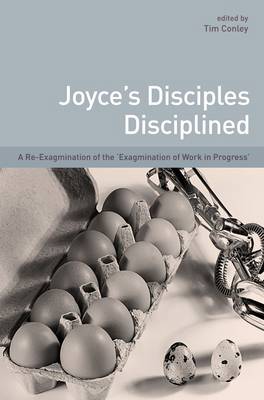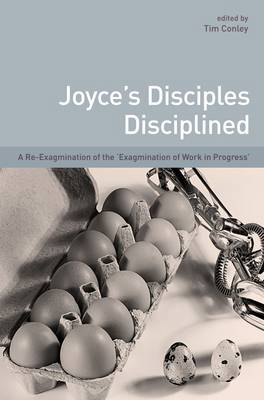
- Afhalen na 1 uur in een winkel met voorraad
- Gratis thuislevering in België vanaf € 30
- Ruim aanbod met 7 miljoen producten
- Afhalen na 1 uur in een winkel met voorraad
- Gratis thuislevering in België vanaf € 30
- Ruim aanbod met 7 miljoen producten
Zoeken
Joyce's Disciples Disciplined
A Re-Exagmination of the Exagmination of Work Inprogress
Tim Conley
Hardcover | Engels
€ 68,95
+ 137 punten
Omschrijving
In 1929, ten years before James Joyce completed "Finnegans Wake", Sylvia Beach published a strange book with a stranger title: "Our Exagmination Round His Factification for Incamination of Work in Progress". Worried by the confusion and attacks that constituted the general reception of his "Work in Progress" (the working title for "Finnegans Wake"), Joyce orchestrated this collection of twelve essays and two 'letters of protest' from such writers as Samuel Beckett, Stuart Gilbert, Eugene Jolas, Robert McAlmon, and William Carlos Williams. "Our Exagmination" represents an altogether unusual hybrid of criticism and advertisement, and since its first appearance has remained a touchstone as well as a point of contention for Joyce scholars. Eighty years later, Joyce's "Disciples Disciplined" reads the "Exagmination" as an integral part of the larger composition history and interpretive context of "Finnegans Wake" itself. This new collection of essays by fourteen outstanding Joycean scholars offers one essay in response to each of the original "Exagmination" contributions.From philosophically informed exegeses and new conceptions of international modernism to considerations of dance, film, and the flourishing field of genetic studies, these essays together exemplify an interdisciplinary criticism that is also a lively and ongoing conversation with that criticism's history.
Specificaties
Betrokkenen
- Auteur(s):
- Uitgeverij:
Inhoud
- Aantal bladzijden:
- 210
- Taal:
- Engels
Eigenschappen
- Productcode (EAN):
- 9781906359461
- Verschijningsdatum:
- 5/12/2010
- Uitvoering:
- Hardcover
- Formaat:
- Genaaid
- Afmetingen:
- 157 mm x 234 mm
- Gewicht:
- 476 g

Alleen bij Standaard Boekhandel
+ 137 punten op je klantenkaart van Standaard Boekhandel
Beoordelingen
We publiceren alleen reviews die voldoen aan de voorwaarden voor reviews. Bekijk onze voorwaarden voor reviews.







